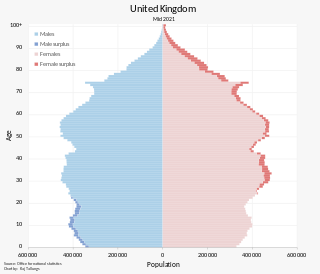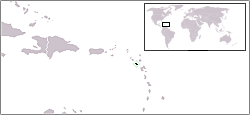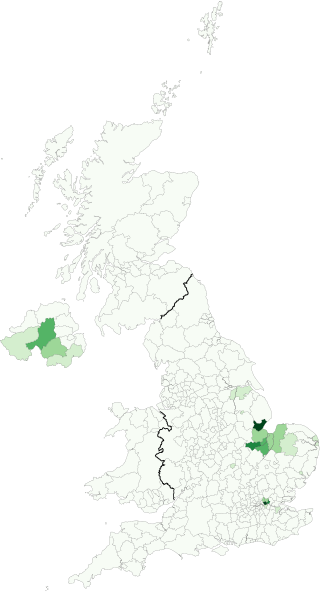Related Research Articles

Montserrat is a British Overseas Territory in the Caribbean. It is part of the Leeward Islands, the northern portion of the Lesser Antilles chain of the West Indies. Montserrat is about 16 km (10 mi) long and 11 km (7 mi) wide, with roughly 40 km (25 mi) of coastline. It is nicknamed "The Emerald Isle of the Caribbean" both for its resemblance to coastal Ireland and for the Irish ancestry of many of its inhabitants. Montserrat is the only non-fully sovereign full member of the Caribbean Community and the Organisation of Eastern Caribbean States.
This is demography of the population of Montserrat including population density, ethnicity, education level, health of the populace, economic status, religious affiliations and other aspects of the population.

The population of the United Kingdom was estimated at over 67.0 million in 2020. It is the 21st most populated country in the world and has a population density of 270 people per square kilometre, with England having significantly greater density than Wales, Scotland, and Northern Ireland. Almost a third of the population lives in south east England, which is predominantly urban and suburban, with about 9 million in the capital city, London, whose population density is just over 5,200 per square kilometre.

Demographics of Wales include the numbers in population, place of birth, age, ethnicity, religion, and number of marriages in Wales.

The demography of England has since 1801 been measured by the decennial national census, and is marked by centuries of population growth and urbanization. Due to the lack of authoritative contemporary sources, estimates of the population of England for dates prior to the first census in 1801 vary considerably. The population of England at the 2021 census was 56,489,800.

Belonger status is a legal classification normally associated with British Overseas Territories. It refers to people who have close ties to a specific territory, normally by birth or ancestry. The requirements for belonger status, and the rights that it confers, vary from territory to territory.
The foreign-born population of the United Kingdom includes immigrants from a wide range of countries who are resident in the United Kingdom. In the period January to December 2016, there were groups from 22 foreign countries that were estimated to consist of at least 100,000 individuals residing in the UK.
Australians in the United Kingdom, or Australian Britons, include Australians who have become residents or citizens of the United Kingdom. The largest segment of Australia's diaspora of 1 million resides in the United Kingdom.

Spaniards in the United Kingdom are people of Spanish descent resident in Britain. They may be British citizens or non-citizen immigrants.

The term Other White, or White Other, is a classification of ethnicity in the United Kingdom, used in documents such as the 2021 United Kingdom Census, to describe people who identify as white persons who are not of the English, Welsh, Scottish, Gypsy, Roma, Irish or Irish Traveller ethnic groupings. In Scotland, the term Other White is also used to refer collectively to those not of Scottish or Other British ethnicity, in which case it also includes those of a Gypsy, Roma, Irish or Irish Traveller background.

South Africans in the United Kingdom include citizens and residents of the United Kingdom with origins in South Africa.
Malaysians in the United Kingdom are British citizens who have full or partial Malaysian origin or descent and Malaysian citizens residing in the United Kingdom. The 2001 UK Census recorded 49,886 Malaysian-born people. The 2011 census recorded 62,396 people born in Malaysia living in England, 2,117 in Wales, 4,721 in Scotland and 705 in Northern Ireland. The largest concentrations of Malaysian-born residents were recorded in Greater London and South East England (11,331). The Office for National Statistics estimates that 75,000 Malaysian-born expatriates were residents in the UK in 2017.
British Moroccans are citizens and/or residents of the United Kingdom whose ethnic origins lie fully or partially in Morocco.
Ugandan migration to the United Kingdom refers to the movement of people from Uganda. Today, a small proportion of people in the United Kingdom were either born in Uganda, or have Ugandan ancestry.
Trinidadian and Tobagonian British people are citizens or residents of the United Kingdom whose ethnic origins lie fully or partially in Trinidad and Tobago.

New Zealanders in the United Kingdom are citizens or residents of the United Kingdom who originate from New Zealand.

According to ONS estimates in 2019 there were 76,000 Nepalese-born people in the United Kingdom.

The following is an alphabetical list of topics related to the British Overseas Territory of Montserrat.
British Overseas Territories Citizens in the United Kingdom is a term referring to individuals who have migrated to the United Kingdom from a British overseas territory; it could also include UK-born people descended of these individuals.

Lithuanians in the United Kingdom include individuals born in Lithuania who have migrated to the UK, among them Lithuanian citizens of Russian descent and Polish Lithuanian citizens, as well as their British-born descendants. The 2011 UK Census recorded 95,730 Lithuanian-born residents in England, 1,353 in Wales, 4,287 in Scotland, and 7,341 in Northern Ireland. The previous, 2001 UK Census, had recorded 4,363 Lithuanian-born residents. The Office for National Statistics estimates that 144,000 Lithuanian-born immigrants were resident in the UK in 2013.
References
- 1 2 "Country-of-birth database". Organisation for Economic Co-operation and Development . Retrieved 20 September 2008.
- ↑ Pattullo, Polly (18 July 2005). "After the volcano". The Guardian. Retrieved 22 December 2008.
- ↑ "2011 Census: Country of birth (expanded), regions in England and Wales". Office for National Statistics. 26 March 2013. Retrieved 9 December 2015.
- ↑ "Country of birth (detailed)" (PDF). National Records of Scotland. Retrieved 9 December 2015.